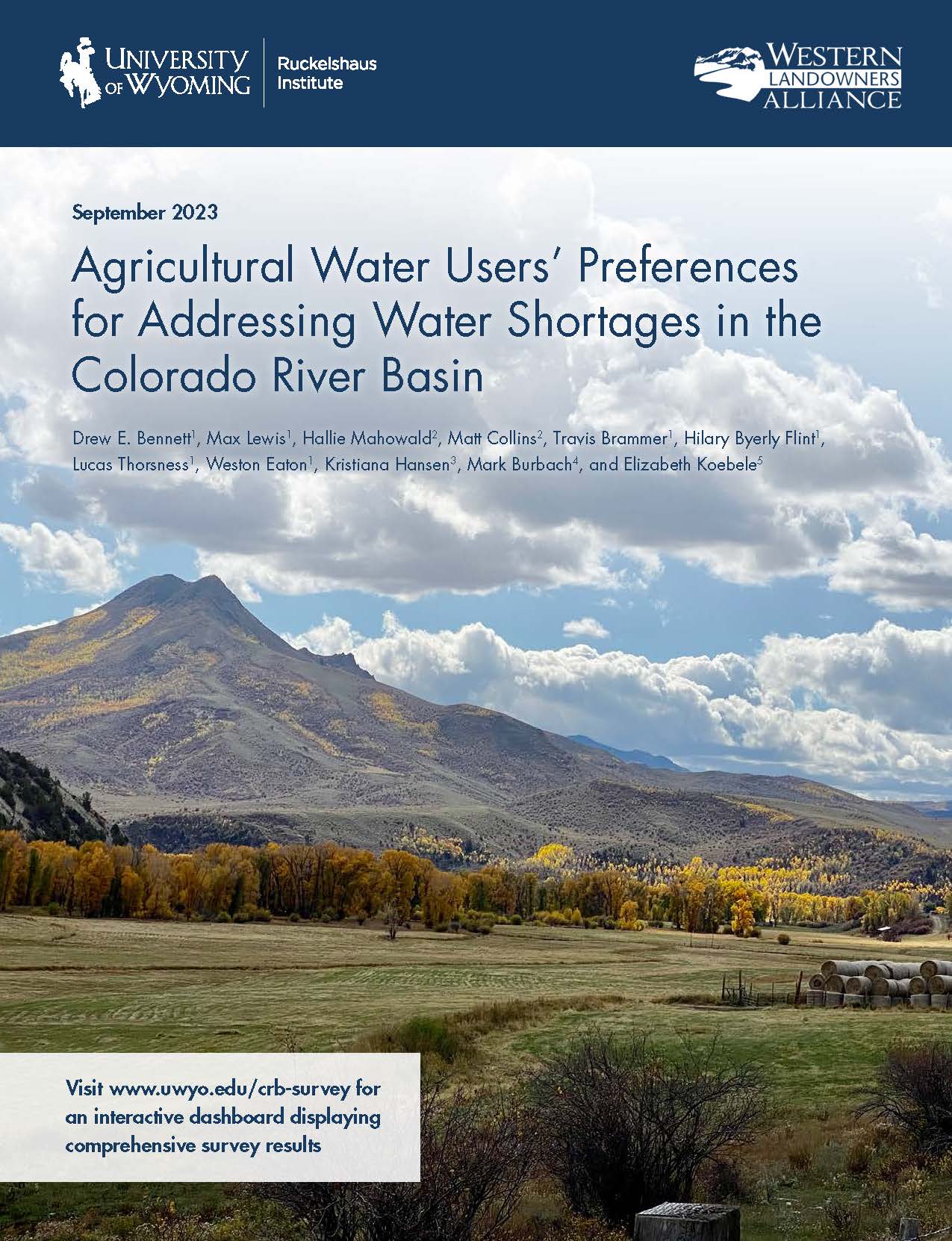New survey of Colorado River Basin irrigators points to challenges, pathways for agricultural water conservation
Denver – An in-depth survey of more than 1,000 farmers and ranchers in the Colorado River Basin has some startling implications for how water conservation in the drought-stricken region could come about. The survey data and report, released today by Western Landowners Alliance and the University of Wyoming, suggest that while the vast majority of agricultural water users in the basin are concerned about water shortages and have already adopted some water conservation measures, recent state and federal efforts to fund conservation in the Basin need to be better targeted to be effective.
“Our findings point to a ‘trust gap’ between producers and federal and state agencies,” said study co-author Hallie Mahowald, the chief programs officer for Western Landowners Alliance. “People overwhelmingly wanted water conservation and management programs to be collaborative and implemented by familiar local organizations.”
The survey, conducted between October 2022 and March 2023, also found a stark lack of awareness of federal and state funding options to support water conservation practices among farmers and ranchers. Nearly 80% of respondents, for example, said they were unaware of the Bureau of Reclamation’s WaterSMART program, which received a major boost in funding from the Bipartisan Infrastructure Law passed in 2021, and which is designed to deliver funding to irrigation districts or other entities that deliver water to improve infrastructure.
The survey report, Agricultural Water Users’ Preferences for Addressing Water Shortages in the Colorado River Basin, was released jointly today by Western Landowners Alliance and the University of Wyoming’s Ruckelshaus Institute. It is available for download at uwyo.edu/crb-survey. An interactive data dashboard that allows users to dig into the data by water user demographics is also available.
Almost 90% of respondents said they were unaware or hadn’t heard of Colorado River System Conservation Pilot Program (also known as the SCPP or the System Conservation Program), a flagship drought-response effort of the Upper Colorado River Commission (UCRC), representing Wyoming, Utah, Colorado and New Mexico, to temporarily reduce water consumption and help refill Lake Powell.
“These programs are complicated, and the UCRC’s own analysis suggested the roll-out of the SCPP was rushed and water users need more clarity and transparency about the details of the program,” said Drew Bennett, study lead from the University of Wyoming’s Haub School of Environment and Natural Resources. “Our data show a major need to provide farmers and ranchers with more information about these programs by working through trusted sources.”
Most survey respondents were unlikely to adopt water conservation practices as part of formal demand management or system conservation programs to address water shortages and were generally opposed to water transfers as a solution to shortages. Only temporary transfers from agricultural water users to other agricultural water users had less than 50% opposition.
“Farmers and ranchers are concerned about the future of the communities they live in and the land they care for,” said Lesli Allison, chief executive officer of the Western Landowners Alliance. “These survey results are in line with those concerns. But they also lay out a pathway to better aligning supply and demand in the basin: one that starts by working with landowners through trusted partners on win-win solutions.”
The study’s authors will be presenting findings and key takeaways in a webinar, open to the public, on Tuesday, September 26th at 11am MT. Register here: https://us06web.zoom.us/webinar/register/7116951590436/WN_h3XXRXDnTL-Qrqh9OHzUnw
###
READ THE REPORT AND EXPLORE THE DATA: uwyo.edu/crb-survey
Join WLA to stay up to date on the most important news and policy for land stewards.
Become a member for free today and we will send you the news and policy developments critical to the economic and ecological health of working lands.
WLA works on behalf of landowners and practitioners throughout the West. We will never share your contact information with anyone.
©2026 Western Landowners Alliance • PO BOX 27798, Denver, CO 80227 • 505.466.1495
Western Landowners Alliance is a 501 (c)(3) non-profit recognized by the IRS.
Tax ID: 46-1346488
